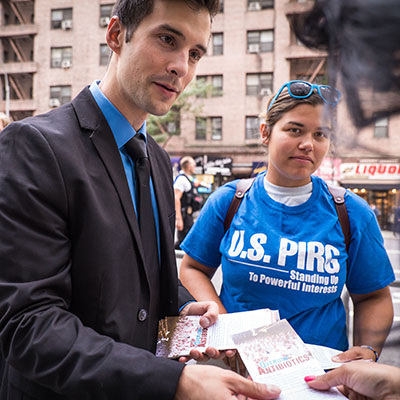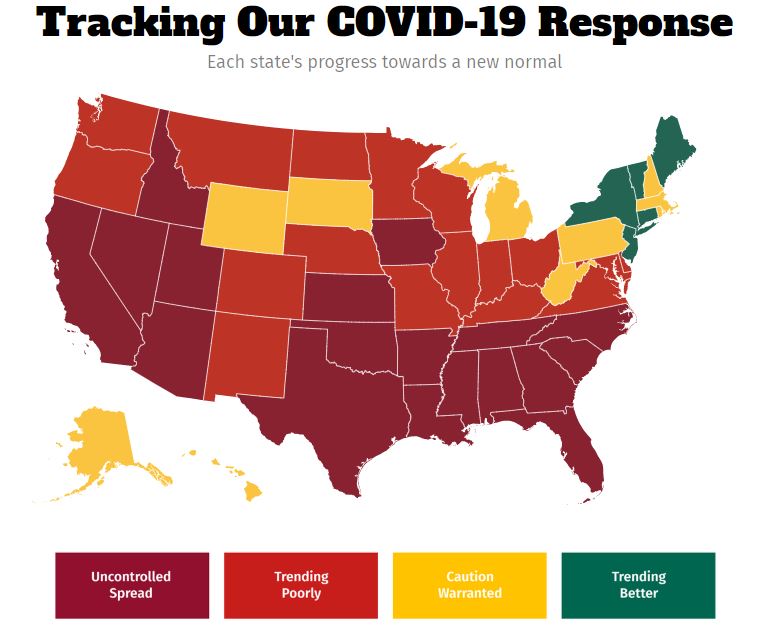
Matt Wellington
Former Director, Public Health Campaigns, PIRG
Few people living today remember what it was like to live through a world war, but that’s what we’re in, and we’re going to have to sacrifice if we want to save ourselves and each other. Just as the greatest generation did, we need to step up to what history has delivered.
Former Director, Public Health Campaigns, PIRG
We’ve done it wrong, and we need to start over.
Of all the nations in the world, we’ve had the most deaths from COVID-19. At the same time, we’re in the midst of “reopening our economy,” exposing more and more people to coronavirus and watching numbers of cases — and deaths — skyrocket.


Map showing breakdown of states’ coronavirus spread as of July 17, 2020, credit covidexitstrategy.org

In March, we all went home and stayed there, to keep ourselves and our neighbors safe. But we didn’t stay home long enough. Our leaders didn’t use the time to set us up to defeat the virus. And then we started to reopen anyway.
Right now we are on a path to lose more than 200,000 American lives by November 1st.
We are racking up that death toll so we can drink in bars, get a haircut, eat inside a restaurant, get a tattoo, get a massage, and do myriad other normal, pleasant, but let’s face it, non-essential activities.
Let’s get our priorities straight.
First of all, let’s honestly assess the enormity of America’s choices. More than 117,000 Americans had died of COVID-19 by mid-June. If our response had been as effective as Germany’s, we would have had only 36,000 COVID-19 deaths in that period in the United States. If our response had been as effective as South Korea, Australia, or Singapore’s, fewer than 2,000 Americans would have died. We could have prevented 99% of those COVID-19 deaths. But we didn’t.
Next, let’s abolish the notion that reopening is the best thing for the nation. The best thing for the nation would be for as many of us as possible to not die from COVID-19.
Then, let’s wake up to the fact that reopening before suppressing the virus isn’t going to help the economy. Economists have gone on record saying that the only way to “restore the economy is to address the pandemic itself,” pointing out that until we find a way to boost testing and develop and distribute a vaccine, open or not, people will not be in the mood to participate.
Next, let’s listen to the experts. Public health professionals have made clear that even after we’ve contained the virus by staying at home, in order to reopen American cities and towns safely, we will need:
In addition, we need more personal protective equipment, or PPE. Many people — medical workers, grocery clerks, and others — do work that actually is essential, and we need to keep them safe. PPE is one of the most effective strategies to slow the spread of COVID-19, and right now we have nowhere near enough PPE.
Finally, let’s do what we need to do now. Non-essential businesses should be closed. Restaurant service should be limited to take-out. People should stay home, going out only to get food and medicine or to exercise and get fresh air. Masks should be mandatory in all situations, indoors and outdoors, where we interact with others.
We need that protocol in place until case numbers recede to a level at which we have the capacity to effectively test and trace. Then, and only then, we can try a little more opening, one small step at a time. We should take those steps only at intervals long enough that we have enough time to see the effects. In the meantime, we need to massively increase our ability to test and trace, so that as we slowly reopen, we can keep a lid on the spread of the virus.
We should also be barring non-essential interstate travel. When we travel freely between states, the good numbers in one state can go bad at the drop of a hat. That’s why New York is not too keen on welcoming Floridians (and visitors from eighteen other states) just now.
If we don’t take these actions, the consequences will be measured in widespread suffering and death. Few people living today remember what it was like to live through a world war, but that’s what we’re in, and we’re going to have to sacrifice if we want to save ourselves and each other. Just as the greatest generation did, we need to step up to what history has delivered.
And leaders, we need you to lead. We need you to tell the American people the truth about the virus, even when it’s hard. We need you to take bold action to save lives — even when it means shutting down again.
We need you to unleash the resources needed to contain the virus: massively ramping up testing, building the necessary infrastructure for effective contact tracing, and providing a safety net for those who need it. Finally, we need to protect healthcare workers so that they can protect all of us. The U.S. Senate has the chance to establish central, transparent coordination of the medical supply chain in its next coronavirus package. Tell them to make it happen.
Many of the actions of our government thus far have fallen short of what the moment demands. Mr. Trump, federal administration, honorable governors: we remind you that history has its eyes on you.
We've turned this blog into an open letter to America’s decision makers on behalf of health professionals across the country. We'll update the list regularly with signatures. If you're a health professional, add your name.
Sign Up
Not a health professional? We need you too.
Sign Up
Former Director, Public Health Campaigns, PIRG